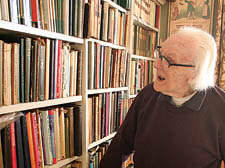|
|
 |
| |

Michael Foot with his late wife Jill’s book collection, which will be on display |
The room that made a William Morris socialist
Ex-Labour leader Michael Foot makes no secret of the debt he owes to his late wife, film-maker and socialist Jill Craigie. Eight years after her death, her study is to be recreated at the Women’s Library in Shoreditch. Michael Mann reports.
MICHAEL Foot has many heroes: Nye Bevan, William Hazlitt, HG Wells, Jonathan Swift and his father, Isaac.
He wrote a book in 1981 celebrating their lives and influence on his own.
But by his own admission his greatest debt is to his wife, the film-maker and ‘William Morris socialist’ Jill Craigie.
Eight years after her death in the Royal Free Hospital aged 85, Michael, 94, has arranged for her study to be recreated in the Women’s Library – formerly the Fawcett Library – in Shoreditch.
There are hundreds of books, including prized first editions by Mary Wollstonecraft, Mary Shelley and her heroine Emmeline Pankhurst.
It is furnished wall-to-wall with original political posters and placards, complemented by newspaper articles and magazines chronicling the feminist movement.
“When you go into her room you get the idea right away of how much of a fight it was,” says the former Labour leader.
An unfinished book written by Craigie in the study, her life’s work about the famous split in the Suffragettes at the onset of the First World War, is to be included in the library’s new ‘Jill Craigie Archive’.
Books by men – from William Morris to John Stuart Mill – will also be included, despite some early protest from the Women’s Library that nearly saw the archive transfer to Plymouth University last year.
He says: “Jill learned lots of her socialism from the writings of William Morris. She often called herself a William Morris socialist. John Stuart Mill wrote The Subjection Of Women, in which he described the wretched way in which women were still being treated in 1870. He put that as powerfully as anyone else at the time.
“She was on to the women’s authors in Virago publications right from the beginning and they will go there too. It was important the library went as a whole.”
He adds: “There are many books inscribed to Jill herself, particularly those by her friend, the writer Rebecca West. She treasured those very much.”
“In a way, nothing has been written that altogether fulfils what the impact of Jill’s room was,” he says.
“She was hot and strong about trying to expose the way some people were using one of the Pankhurst daughters against the other to disparage Emmeline.
“For Jill, Emmeline was the very best and the one who knew they had to make the changes when the war broke out. She repudiated any charge that Emmeline was betraying the cause. Jill tried to express it in writing – but she was blocked like many of the great writers were.
“She was a good journalist but she did not enjoy the actual process of writing. All her films had real climaxes but she could not finish the book.”
Michael met Jill while campaigning in bomb-blasted Plymouth as a Labour candidate weeks before the party’s famous landslide victory in 1945.
Jill was producing and directing a film about social housing called The Way We Live. The Devonport constituency proved a powerful platform and featured the 29-year-old renegade.
“She came to Plymouth at the time of that election and saw all the excitement then,” he says.
“And she portrayed the Labour victory as a great victory – as it was! And in a kind of way, she understood how big the swing was up and down the country, and there were not many that understood it at the time.”
He adds: “When my mother saw Jill directing the film she said to me, ‘She’s the woman for you’. I said, “Yes, that’s all very well, but I must tell you she’s already married’.”
A year later they met again at a Miners’ Gala in Durham.
He says: “It was a very proper place to consolidate the whole thing. She came up with the chap who was from the BBC. But I’m very glad to say she came home with me.”
After a brief spell in Park Street, which sparked accusations from Jill that Michael was a ‘Mayfair socialist’, they moved to Pilgrim’s Lane, Hampstead, in 1964. Michael had been mysteriously sacked as literary editor on the Daily Herald and a big pay-off followed, allowing Jill to transform the house.
For all the importance of the library to Michael, it was perhaps Jill’s artistic influence on him that was most significant.
“Most of all she instructed me on art, music and film. This house was filled with Mozart and we still play her music through the gramophone. And this! (he waves in the direction of a mountain of books stacked on the dining-room table) She would never have had this!”
’s Library on September 19. |
 |
|
| |
|
 |
|

